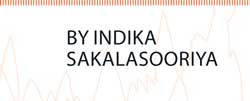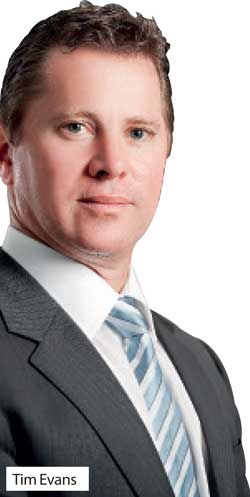26 Mar 2018 - {{hitsCtrl.values.hits}}
 HSBC has always been in the forefront of Sri Lanka’s growth story—may it be funding the big infrastructure projects, raising funds for the government in the international capital markets or helping out local corporates to expand their presence and capabilities locally and internationally.But it seems that the development work that is happening now at an improved pace, largely driven by the private sector, has enticed HSBC even more towards Sri Lanka as the bank is seeing ample opportunities to grow its presence and support the new wave of growth.In this backdrop, Mirror Business met with Tim Evans, Head of Commercial Banking International Markets, Asia Pacific for HSBC, who was on a brief visit to Sri Lanka, to discuss HSBC’s further energized plans for Sri Lanka. Tim currently looks after commercial banking operations in Bangladesh, Maldives, Mauritius, New Zealand, Sri Lanka, Taiwan, Thailand and Vietnam.
HSBC has always been in the forefront of Sri Lanka’s growth story—may it be funding the big infrastructure projects, raising funds for the government in the international capital markets or helping out local corporates to expand their presence and capabilities locally and internationally.But it seems that the development work that is happening now at an improved pace, largely driven by the private sector, has enticed HSBC even more towards Sri Lanka as the bank is seeing ample opportunities to grow its presence and support the new wave of growth.In this backdrop, Mirror Business met with Tim Evans, Head of Commercial Banking International Markets, Asia Pacific for HSBC, who was on a brief visit to Sri Lanka, to discuss HSBC’s further energized plans for Sri Lanka. Tim currently looks after commercial banking operations in Bangladesh, Maldives, Mauritius, New Zealand, Sri Lanka, Taiwan, Thailand and Vietnam.
What is the purpose of your visit to Sri Lanka?
I look after 10 countries in the Asia Pacific region and Sri Lanka is one of them. It’s a market where we see increased opportunity for us and as a part of our investment into the market we’ve appointed Stuart Rogers as the new head of the corporate bank here.
And one of the things I challenged Stuart about was that I wanted him to put together a strategic review of the business and how we would look to do more going forward. We’ve been here in Sri Lanka for over 125 years. We are very committed to the market and we think that there is opportunity to do a lot more. HSBC strategically has engaged in a strategy what is called ‘Pivot to Asia,’ basically it means greater focus on Asia from a business perspective. We believe that there are opportunities in Sri Lanka going forward that HSBC will be able to contribute to. If you look out of the window you’d see the port over there and we’ve been involved with some of the players there. So my point is you don’t have to travel too far from this building to realize the opportunities we are trying to tap into.
 What are the key sectors HSBC has identified in Sri Lanka that the bank hopes to fund?
What are the key sectors HSBC has identified in Sri Lanka that the bank hopes to fund?
We operate across a number of sectors. Obviously we touch on infrastructure and Belt and Road. As a bank with its history in Hong Kong and Shanghai we are very close to China. We have a strong presence in China. When China goes out— whether its RMB internationalization or Belt and Road initiative—we will look at projects in a selected basis and look to fund them. As you know there is an infrastructure piece, specially around Belt and Road.
We also continue to support Sri Lanka’s garment industry players—the main big players. We support them not just here but as they go out and start operating internationally creating production capabilities in surrounding markets whether it’s Bangladesh, India or Vietnam.
We look to support pretty much any import-export business into the country. And then we also support the multi-nationals that will look to come and operate in this market. So we have a dedicated team who look after the multinational or the international subsidiaries that are operating in the market. We have different pillars that we target in the market. It’s pretty broad spectrum.
I think the challenges are not limited to Sri Lanka. Globally there is a little bit of concern around what seems to be a growing impression of protectionism, which I think impacts not just Sri Lanka but all the different economies
You talked about the opportunities. But what are the challenges this market presents?
I think the challenges are not limited to Sri Lanka. Globally there is a little bit of concern around what seems to be a growing impression of protectionism, which I think impacts not just Sri Lanka but all the different economies. Now whether or not that actually manifests itself into something concrete remains to be seen. If you are an export-based economy, if you have strong export flows that is something that one has to be mindful of. But right now we see more opportunities than adversities in this market and we feel positive about them. That’s why we invest in people, in processes, technology, all of which will benefit our franchise here.
What are the opportunities the Sri Lanka banking space presents to a global bank like HSBC?
I don’t live in Sri Lanka. I live in Hong Kong. To my understanding there are 25 banks in Sri Lanka. It’s 50:50 between international and local banks. We have been here for 125 years. My understanding is that we are the largest international bank that is operating here. And I think that going forward, there will be greater opportunities for all banks.
As Sri Lankan firms get more internationally connected, you would start to see some large Sri Lankan entities, who have already ventured out to closer shores, such as India, Bangladesh or Vietnam, looking to have presences in the U.S. or the Caribbean to source into the U.S. So I think as Sri Lanka becomes more internationally connected, the opportunities for international banks will be there.
How concerned is HSBC about the anti global trade, protectionist sentiment that is propagated by Trump policies in the US?
We don’t make political comments. I think our view would be that one has to be very careful with protectionism and what the knock-on impact would be. Trade wars that start small could escalate quickly. Hopefully it’s more rhetoric than it is anything practised. We look at it very closely. I’m not a politician and I’m not an economist. I’m just a simple banker. So I can only relate to you the stories that our customers tell us. Depending in which industry you are in and where you are operating from, the customers have started to make contingency plans around it.
We look to support pretty much any import-export business into the country. And then we also support the multi-nationals that will look to come and operate in this market
Which is the bigger threat to global banking—protectionism or cyber financial crimes now taking place at a heightened pace?
As a bank we look at all risks and to be able to say which one is greater than the other is very difficult to quantify. I think protectionism is a risk. Likewise geo-political risk is always there. There is economic risk and there is financial crimes risk. We have spent a lot of time to combat financial crime. I mean as an industry if you look at the statistics it’s between 2-5 percent of global GDP that is related to financial crime. We spend a significant amount of time and effort and investment ensuring that we have processes and technology in place that enables us to fight against that. Like all banks we have risk meetings where we sit down and look at all the emerging risks that may impact us and they vary over time. We have to be mindful to face them when they arrive.
From where do you see competition for global banks like you coming in the near future? Is it from within or outside—like from the fintech firms?
Well, banks are very big organizations and they operate in different areas. If you look at the retail banking space it’s s different competitive landscape from the corporate banking landscape, which is completely different from investment banking space. But touching on fintech, my personal view is that some banks may have seen fintech as a threat and they were going to take over banks. I think we have a slightly different view. Our view is that you have these little pockets of innovations that are finding ways within the industry where we haven’t innovated quickly enough or we haven’t been able to keep up with the demand from our customers. If you can effectively partner some of these fintechs—I mean we are spending US $ 2 billion on that to work with them in partnership so we have an ecosystem where fintechs will help us in delivering banking services, mainly in the retail banking side. So, I don’t see fintechs as a threat. If you embrace it and if you engage with them I see it as a sense of opportunity. I don’t think they will disrupt the banking the same way you download music or how Uber has disrupted the taxi industry. We embrace it and we support a number of them and they bring a lot of good ideas to us and we used to adopt some of them. We haven’t gone and approached a fintech to buy it and integrate it to HSBC. We work with them and we allow them to sit outside and still be very entrepreneurial, creative and nimble.
So the banks shouldn’t try and develop fintech capabilities within?
I can comment on what we are doing. Our view is that the very reason that fintechs are creative and forward thinking and innovative is because they have the freedom to think very clearly and are not constrained by processes, policies, history and legacy systems. So our view is that you are better off partnering with people that have that creative skill rather than trying to build them in house, where you will sometimes get bogged down by archaic thinking.
So with this fintech revolution, have recruitment policies of global banks like your changed? I mean favouring more IT related professionals than people with finance backgrounds?
We will always need banking professionals. But we will continue to evolve. We need to make sure that we have the best talent whether it is into our marketing functions or finance functions or innovation functions. We will try and get the best people possibly we can. That is all part of an organization evolving and getting better.
Fundamentally, in very simpler terms what does a bank do? A bank takes deposits from people who have a lot of cash and then lend it to people who have a lot of ideas but are short of cash. In the middle banks take a margin. So you will continue to need bankers who understand the customers and what their business is and what the risks are to lend the money profitably. That will always be at the very essence of what banking is. Yes absolutely we will hire people with more innovative thinking. But like myself, I’ve been in the industry for about 25 years. But I had to learn what is financial crime, innovation etc. which I probably didn’t have to do 15 years ago. So its not just hiring people but also the people we have are evolving to become slightly different form of bankers.
We don’t make political comments. I think our view would be that one has to be very careful with protectionism and what the knock-on impact would be. Trade wars that start small could escalate quickly
 What is the next big thing for HSBC Sri Lanka?
What is the next big thing for HSBC Sri Lanka?
Well, I don’t think there is a big strategic move here. I think a lot of it is more of the same. I think we are partnering a lot of the infrastructure development that is taking place. It won’t be everything but selectively we will look to work with partners. The project that is happening at the Colombo port is a very interesting project. I’ve been coming here for the last three years. When I came here three years ago and from the top of the Kingsbury when I looked across out they said to me that they were going to reclaim the land there. I was not sure that would happen but now its there. If you look at it along the Galle Face road, you see the Shangri-La hotel and that whole complex being built. So clearly there is activity, there is development taking place, and we need to tap into that for the benefit of our customers and for the benefit of the country.
We are very committed to the market and we’ve been here for over 125 years. We are a long-term player. Our investments don’t necessarily be in the form of acquiring other banks. We will continue to bring modern technology, processes and international thinking to Sri Lanka. That is how we intend to develop the franchise in Sri Lanka.
19 Nov 2024 30 minute ago
18 Nov 2024 8 hours ago
18 Nov 2024 9 hours ago
18 Nov 2024 9 hours ago
18 Nov 2024 18 Nov 2024